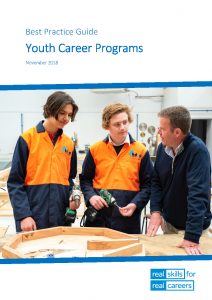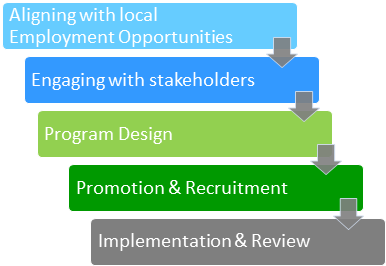 The Youth Career Program Best Practice Guide has been developed from the experiences of the Apprenticeship Employment Network (AEN), Group Training Organisations (GTOs), Youth, Schools and Employers who have been involved in over 170 “multi-industry pilot” programs during 2016-18.
The Youth Career Program Best Practice Guide has been developed from the experiences of the Apprenticeship Employment Network (AEN), Group Training Organisations (GTOs), Youth, Schools and Employers who have been involved in over 170 “multi-industry pilot” programs during 2016-18.
The guide covers a range of topics to support local stakeholders to continue to work with each other to support local youth into apprenticeship pathways:

These programs trialed various themes in industries supporting Apprenticeships and Traineeships including;
- Engineering and Automotive
- Building and Construction
- Land, Food and Fibre
- Business and Community Care Services.
Programs were developed to address issues including:
- Assisting youth in making better informed career choices
- Providing work ready candidates and recruitment support for Small to Medium Enterprises (SME’s)
- Improving non completion rates in Apprenticeships and Traineeships
Current data indicates that 42% of Apprentices and Trainees do not complete their contract of training and almost 30% cancel within the first 12 months. There are undoubtedly many reasons why an individual fails to complete their apprenticeship, however high levels of non-completion or attrition, especially within the first 12 months, indicate that many young people make the “wrong choice” at the beginning of their journey.
The programs trialled various methods to support participants through a range of industry experiences to assist young people make a more informed choice into further study or employment pathways in vocational (apprenticeship) industries.
Key aspects of the programs included:
- Hands-on experience and knowledge sharing in multiple industries and occupations
- Collaborative relationships between program stakeholders of youth career pathway
- Supporting youth to make informed decisions to enter a vocational career pathway and to gain and complete an apprenticeship or traineeship for those who choose this pathway
- Exploring 3-4 trade/industry areas and understanding the career needs in regards to:
- Numeracy, language and literacy skills
- Workplace readiness – understanding employer expectations
- Sustainability and environmental requirements of particular industries
- Legal requirements of working in particular industries
- Business processes, project management and communication skills
- New and emerging technology for particular industries
- Career and further study pathways available in different industries.
Program measures included:
- Young adults’ knowledge of apprenticeship/traineeship and industries of theme at entry and exit of project
- Participants’ assessment of value of various elements
- Assistance for participant’s career decisions
- Work experience host employers’ view of individual work and industry readiness, attitude and aptitude
- Work experience host employers’ view of the value of, and experience needed, to host work experience
Over 50% of participants found their career of interest is now different to what they previously thought.
Follow the link below or click the image to download the guide.